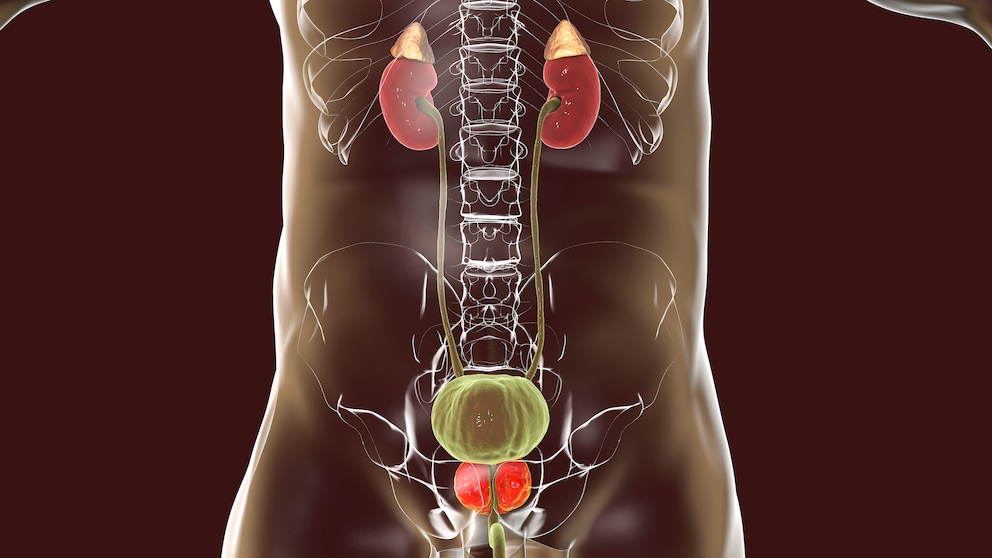January 29, 2025, 4:06 pm | Read time: 4 minutes
Prostate cancer is the most common type of cancer in men in Germany. Prevention and preventive measures can, therefore, make the difference between life and death. Food consumption also plays an important role in this, as a new study has shown.
According to “Deutsche Krebshilfe,” 61,200 men receive a prostate cancer diagnosis in Germany annually.1 Therefore, it is recommended that men starting at age 40 undergo regular preventive screenings for early detection.2 But there is obviously more that can be done: As with many diseases, lifestyle factors also have a major influence on the risk of developing them. A recent study has explored the specific relationship between diet and prostate cancer, shedding light on the significant role the gut plays in this context.
Overview
Study on Diet and Prostate Cancer
The study was conducted by the Cleveland Clinic (USA) and will appear in the journal Cancer Epidemiology, Biomarkers & Prevention.3 For their research, the scientists utilized data from the “PLCO Cancer Screening Trial,” a comprehensive randomized controlled trial conceived and financed by the National Cancer Institute (NCI).4 148,000 men aged between 55 and 74 took part in the trial, 76,685 of whom were screened for prostate cancer and subsequently followed for up to 13 years.
Analysis of Blood Serum
During the PLCO cancer screening, all participants provided blood samples. To investigate the potential link between diet and prostate cancer, Cleveland Clinic researchers conducted an analysis of this blood serum. They were interested in various metabolic products (metabolites) that are formed by intestinal bacteria through food intake. They then compared the results of the blood analysis of men who later died of prostate cancer with control subjects.
3 metabolic products play an important role
Indeed, the scientists discovered a potential association between three metabolites and aggressive prostate cancer. These are the following metabolic products:
- Phenylacetylglutamine
- Choline
- Betaine
Phenylalanine, Choline, and Betaine Can Increase Cancer Risk
Phenylacetylglutamine is produced when intestinal bacteria break down phenylalanine, an essential amino acid. Choline and betaine are contained in some foods but are also formed in the intestine. “Our study results suggest that dietary intake has a complex interaction with gut bacteria that influences lethal prostate cancer risk,” explained Dr. Sharifi, leader of the study. “Men with higher levels of certain dietary molecules have a higher risk of developing aggressive prostate cancer.”
In fact, the researchers found that men with elevated levels of phenylacetylglutamine in their blood serum at baseline had a 2.5 times higher risk of dying from prostate cancer than men with the lowest levels. Men with elevated choline or betaine levels were almost twice as likely to die from fatal prostate cancer as the control group.
Foods that Could Increase the Risk of Prostate Cancer
Given these findings, what implications do they have for one’s diet? If you want to prevent prostate cancer, you could reduce the proportion of foods containing these metabolites in your diet.
Phenylalanine is found in protein-rich foods such as dairy products, meat, poultry, soy, fish, beans, nuts, and diet drinks sweetened with aspartame. Choline is mainly found in animal products such as meat, fish, eggs, and dairy products, but also in pulses, nuts, and seeds. Foods with a high betaine content include shellfish, wheat, spinach, and beets.
Conclusion: Completely Avoid Certain Foods?
The study’s authors note that while they established a correlation between phenylalanine, choline, betaine, and prostate cancer, they could not confirm a causal relationship. Further research is needed to be able to say exactly what the metabolism has to do with the likelihood of developing prostate cancer.
Nonetheless, this new study from the US reaffirms a particular finding: high consumption of meat may be detrimental to health. Earlier studies have already shown that high meat consumption can promote cancer.5 A finding that the current study on diet and prostate cancer now confirms once again. Two of the three metabolites discovered are also contained in meat, suggesting that avoiding animal products can also be beneficial for prostate health.

According to a Study Certain Intestinal Bacteria Causes Sugar Cravings

Study Eating These Fruits Can Reduce Your Risk of Depression By 20 Percent

According to a Study Dairy Products Are Good for the Gut — Apparently with One Exception
Sources
- German Cancer Aid. Prostate cancer (prostate carcinoma). (accessed on 5.11.2021)
- Federal Association of Statutory Health Insurance Physicians. Basic prevention. Early detection of prostate cancer. (accessed on 5.11.2021)
- Sharifi N, Reichard CA, Naelitz BD et al (2021). Gut Microbiome-Dependent Metabolic Pathways and Risk of Lethal Prostate Cancer: 2 Prospective Analysis of a PLCO Cancer Screening Trial Cohort. Cancer Epidemiology, Biomarkers & Prevention.
- PLCO Project Team, Gohagan JK, Prorok PC et al. (2000). The Prostate, Lung, Colorectal and Ovarian (PLCO) Cancer Screening Trial of the National Cancer Institute: History, organization, and status. Controlled Clinical Trials
- Pan A, Sun Q, Bernstein AM et al (2012).Red Meat Consumption and Mortality. Results From 2 Prospective Cohort Studies. JAMA International Medicine

